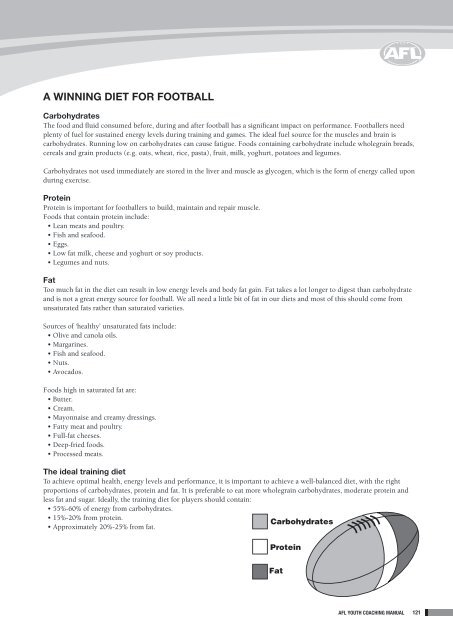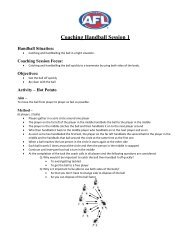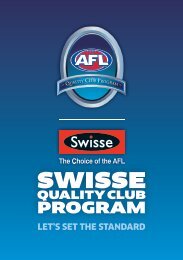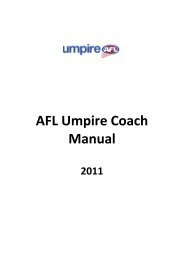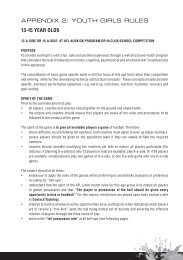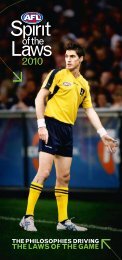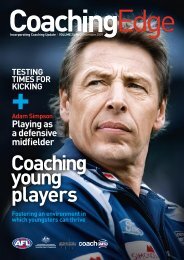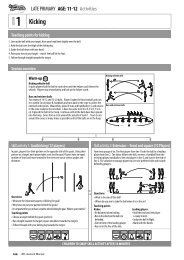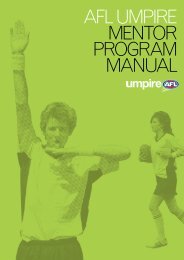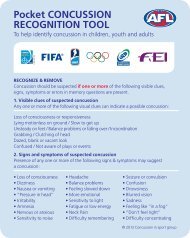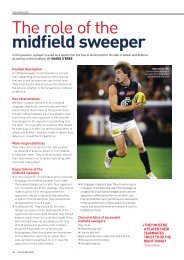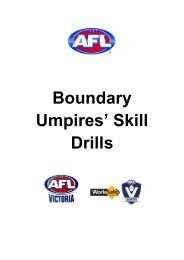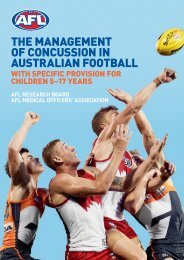2012 Youth Coaching Manual - AFL Community
2012 Youth Coaching Manual - AFL Community
2012 Youth Coaching Manual - AFL Community
You also want an ePaper? Increase the reach of your titles
YUMPU automatically turns print PDFs into web optimized ePapers that Google loves.
A winning diet for football<br />
Carbohydrates<br />
The food and fluid consumed before, during and after football has a significant impact on performance. Footballers need<br />
plenty of fuel for sustained energy levels during training and games. The ideal fuel source for the muscles and brain is<br />
carbohydrates. Running low on carbohydrates can cause fatigue. Foods containing carbohydrate include wholegrain breads,<br />
cereals and grain products (e.g. oats, wheat, rice, pasta), fruit, milk, yoghurt, potatoes and legumes.<br />
Carbohydrates not used immediately are stored in the liver and muscle as glycogen, which is the form of energy called upon<br />
during exercise.<br />
Protein<br />
Protein is important for footballers to build, maintain and repair muscle.<br />
Foods that contain protein include:<br />
• Lean meats and poultry.<br />
• Fish and seafood.<br />
• Eggs.<br />
• Low fat milk, cheese and yoghurt or soy products.<br />
• Legumes and nuts.<br />
Fat<br />
Too much fat in the diet can result in low energy levels and body fat gain. Fat takes a lot longer to digest than carbohydrate<br />
and is not a great energy source for football. We all need a little bit of fat in our diets and most of this should come from<br />
unsaturated fats rather than saturated varieties.<br />
Sources of ‘healthy’ unsaturated fats include:<br />
• Olive and canola oils.<br />
• Margarines.<br />
• Fish and seafood.<br />
• Nuts.<br />
• Avocados.<br />
Foods high in saturated fat are:<br />
• Butter.<br />
• Cream.<br />
• Mayonnaise and creamy dressings.<br />
• Fatty meat and poultry.<br />
• Full-fat cheeses.<br />
• Deep-fried foods.<br />
• Processed meats.<br />
The ideal training diet<br />
To achieve optimal health, energy levels and performance, it is important to achieve a well-balanced diet, with the right<br />
proportions of carbohydrates, protein and fat. It is preferable to eat more wholegrain carbohydrates, moderate protein and<br />
less fat and sugar. Ideally, the training diet for players should contain:<br />
• 55%-60% of energy from carbohydrates.<br />
• 15%-20% from protein.<br />
• Approximately 20%-25% from fat.<br />
<strong>AFL</strong> <strong>Youth</strong> <strong>Coaching</strong> <strong>Manual</strong><br />
121


